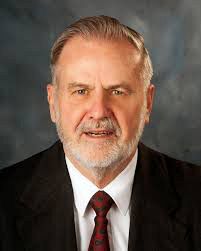Diocesan Pastoral Congress: Summary of Brother Loughlan's presentation
SALT LAKE CITY — The presenter for the English portion of the 2021 diocesan Pastoral Congress was Brother Loughlan Sofield, ST. His talk was titled “Leadership in the Pandemic Church.”
A Missionary Servant of the Most Holy Trinity, Br. Loughlan has served on the advisory board of the National Conference of Catholic Bishops’ Committee on Laity, Family, Women, and Youth. He has written about collaborative ministry, community building and conflict resolution. In the Diocese of Salt Lake City, Br. Loughlan is a guest presenter for the lay ecclesial ministry formation program.
In his video presentation for the Pastoral Congress, Br. Loughlan started with a prayer by St. Therese of Avila that begins “Christ has no body now but yours….” He said he often uses that prayer when he gives parish missions; “it helps people to realize their individual call to live Christ.”
In his talk, he spoke of two of the calls listed in the U.S. Conference of Catholic Bishops’ 1995 document “Called and Gifted for the Third Millennium.” In the document, the bishops spoke of an active spirituality that comes from living the Beatitudes, and also that people are called to minister in their home, workplace and neighborhood, Br. Loughlan said.
He asked what percentage of gifts that God has placed in the parish of those listening to the video are being used. “Can you imagine what your parish would be like if you could create the space where everyone began to realize their call to ministry?” he asked.
Catholics are called to model Christ, who was compassionate, offered healing and forgiveness, was full of life and was “a disciple of hope,” Br. Loughlan said.
He then went on to discuss each of those virtues.
“I believe that if I want to be Christ-like I’ve got to begin by becoming more compassionate,” he said. “For me, compassion is the place where spirituality and ministry meet.”
To minister to another person, one must first listen to their story, he said. “How can I be compassionate if I never know the other person’s story, if I never take the time to listen to them? … Listening is at the heart of ministry.”
On the theme of forgiveness, he quoted the Catechism of the Catholic Church: The “… outpouring of [God’s] mercy cannot penetrate our hearts as long as we do not forgive those who have trespassed against us. … In refusing to forgive our brothers and sisters, our hearts are closed and their hardness makes them impervious to God’s love.” [CCC 2840]
“God’s love, God’s mercy, cannot come in until I forgive,” he said.
People have complete control over whether or not they will forgive, he said, but stressed that forgiveness doesn’t remove the responsibility for justice, nor is it a call to forget. He gave several steps for the process of forgiveness, starting with acknowledging the pain and praying to God for the gift of forgiveness.
He also urged people to be patient during the process.
“Pease don’t rush to forgiveness, because if you rush to forgiveness, all you get is a pseudo-forgiveness. Forgiveness takes time,” he said.
The first step in dealing with loss is the same as that of forgiveness: to acknowledge all the emotions that are being felt, he said. Those feelings must be accepted and talked about, he said, and people must be given sufficient time to grieve before they allow new people into their life.
“Our churches, our parishes, have to do to more in terms of helping people go through the grieving process in times of loss,” he said.
Hope is needed in today’s world, he said, particularly in this post-pandemic time when many people feel despair.
“The desire and hunger for hope is universal,” he said, adding, “We are death/resurrection people … We have to witness the Resurrection to people.”
In preparing missionary disciples, a parish can ask people to offer their gifts, not just what they think of as positive things but also something such as suffering the death of a child, a story that could be shared to minister to others who are going through similar situations.
In closing, Br. Loughlan issued this challenge: “Somewhere in the course of our time together, God has spoken to you and God has called you to growth, to change, to live like Christ, and to lead others to Christ.”
The entire video of Br. Loughlan’s presentation can be found at https://www.dioslc.org/ under Pastoral Congress 2021.
© Copyright 2024 The Diocese of Salt Lake City. All rights reserved.


Stay Connected With Us